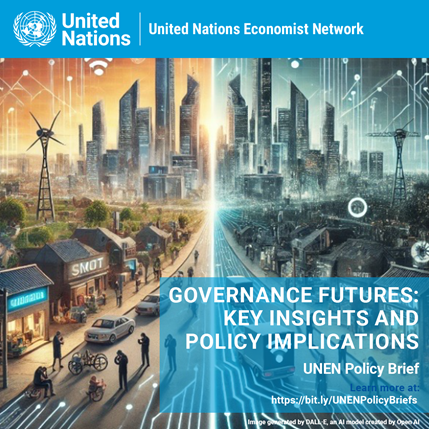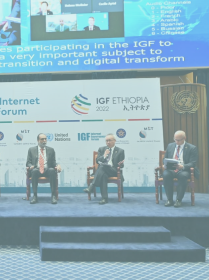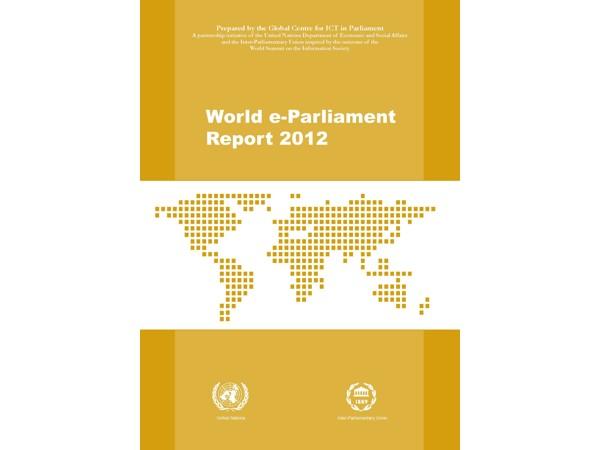| Publications | Policy Briefs | Public Institutions
UNEN Futures and Foresight Policy Brief: GOVERNANCE FUTURES
The UN Economist Network has released a new Futures and Foresight Policy Brief on Governance Futures: Key Insights and Policy Implications. This Policy Brief examines the limitations of current governance systems and proposes alternative models…
| Policy Briefs | Public Institutions
UN DESA Policy Brief No. 156: Enhancing Public Institutions’ Risk-informed Communication to address Multifaceted Crises for Disaster Risk Reduction, Resilience and Climate Action
The ability to initiate, plan, develop, coordinate, and disseminate accurate, timely, and reliable information, alerts, warnings, and notifications to the public and responders in crises situations is central to risk-informed communication. Risk-…
| Reports | Public Institutions
DESA highlights Report: Strengthening National Institutions and Accountability
Effective, inclusive and accountable public institutions and digital government are key to people's well-being in every society across the world. UN DESA, through its support to public institutions in the design and implementation of public policies…
| Policy Briefs | Digital Government | Public Institutions | Public Service Innovation
UN/DESA Policy Brief No. 139: Strengthening Disaster Risk Reduction and Resilience for Climate Action through Risk-informed Governance
Strengthening Disaster Risk Reduction and Resilience for Climate Action through Risk-informed Governance
Key Messages
Governments that consider risk in policymaking and successfully integrate risk management into their governance frameworks and…
| Policy Briefs | Public Institutions
UN DESA Policy Brief No. 136: Promoting non-discrimination in public administration: some entry points
Promoting non-discrimination in public administration: some entry points
Key messages
Public administration can both serve as a vehicle for discrimination and provide channels to address it.
Research is needed, in particular from developing…
| Policy Briefs | Public Institutions
UN/DESA Policy Brief #116: A view of Changes in Institutional Arrangements for SDG Implementation at the National Level Since 2015
Five years after the adoption of the 2030 Agenda for Sustainable Development, with one third of the implementation period of its 17 Sustainable Development Goals having elapsed, it is important to take stock of relevant institutional arrangements at…
| Policy Briefs | Participation and Accountability | Public Institutions
UN/DESA Policy Brief #114: Connecting the Dots: The Still Elusive Synergies Between Accountability Institutions and the Follow-up and Review of the Sustainable Development Goals
The 2030 Agenda highlights the importance of the follow-up and review of the Sustainable Development Goals (SDGs) as an accountability mechanism and sets clear principles to guide it. Accountability institutions such as parliaments and supreme audit…
| Policy Briefs | Participation and Accountability | Public Institutions
Resilient Institutions in Times of Crisis: Transparency, Accountability and Participation at the National Level Key to Effective Response to COVID-19
National institutions are strongly impacted by the coronavirus (COVID-19). The pandemic has disrupted to varying extents the regular functioning of state institutions, such as parliaments and justice systems, and affected key government functions…
| Policy Briefs | Public Institutions
COVID-19: Reaffirming State-People Governance Relationships
The emergence and spread of the coronavirus in late 2019 and the impact of its disease, COVID-19, which has been categorized by the World Health Organization as a global pandemic, is, at the time of writing, ongoing.
Efforts by governments to…
| Reports | Public Institutions
World e-Parliament Report 2012
The World e-Parliament Report 2012 documents the efforts of legislatures to use information and communication technologies (ICT) to support their constitutional functions. The Report is based on the Global Survey of ICT in Parliaments 2012 conducted…
| Reports | Public Institutions
World e-Parliament Report 2010
Prepared by the Global Centre for ICT in Parliament, a broad partnership initiative of the United Nations Department of Economic and Social Affairs (DESA) and the Inter-Parliamentary Union, the World e-Parliament Report 2010 offers parliaments a…
| Reports | Public Institutions
World e-Parliament Conference Report 2009
The World e-Parliament Conference 2009 took place at the U.S. House of Representatives in Washington, D.C., on 3, 4 and 5 November 2009. The conference was co-organized by the United Nations, the Inter-Parliamentary Union, the U.S. House of…
 欢迎来到联合国,您的世界!
欢迎来到联合国,您的世界!









